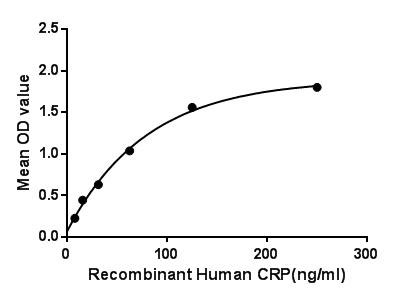Active C Reactive Protein (CRP)
C-RP; PTX1; Pentraxin-Related; Pentraxin 1
- Product No.UAPA821Hu01
- Organism SpeciesHomo sapiens (Human) Same name, Different species.
- Buffer FormulationPBS, pH7.4, containing 0.01% SKL, 1mM DTT, 5% Trehalose and Proclin300.
- TraitsFreeze-dried powder
- Purity> 97%
- Isoelectric Point5.5
- ApplicationsCell culture; Activity Assays.
- Download Instruction Manual
- UOM 10µg50µg 200µg 1mg 5mg
-
FOB
US$ 120
For more details, please contact local distributors!US$ 300
For more details, please contact local distributors! US$ 600
For more details, please contact local distributors! US$ 1800
For more details, please contact local distributors! US$ 4500
For more details, please contact local distributors!
ACTIVITY TEST of the Active C Reactive Protein (CRP)

Figure. The binding activity of CRP with RPL23A.
C Reactive Protein (CRP) is an annular (ring-shaped), pentameric protein, a member of the pentraxin family of proteins. It is an acute-phase protein of hepatic origin that increases following interleukin-6 secretion by macrophages and T cells. Its physiological role is to bind to lysophosphatidylcholine expressed on the surface of dead or dying cells (and some types of bacteria) in order to activate the complement system via C1q. CRP is synthesized by the liver in response to factors released by macrophages and fat cells (adipocytes). Besides, Ribosomal Protein L23A (RPL23A) has been identified as an interactor of CRP, thus a binding ELISA assay was conducted to detect the interaction of recombinant human CRP and recombinant human RPL23A. Briefly, CRP were diluted serially in PBS, with 0.01% BSA (pH 7.4). Duplicate samples of 100μL were then transferred to RPL23A-coated microtiter wells and incubated for 2h at 37℃. Wells were washed with PBST and incubated for 1h with anti-CRP pAb, then aspirated and washed 3 times. After incubation with HRP labelled secondary antibody, wells were aspirated and washed 3 times. With the addition of substrate solution, wells were incubated 15-25 minutes at 37℃. Finally, add 50µL stop solution to the wells and read at 450nm immediately. The binding activity of CRP and RPL23A was shown in Figure 1, and this effect was in a dose dependent manner.
USAGE of the Active C Reactive Protein (CRP)
Reconstitute in 10mM PBS (PH7.4) to a concentration of 0.1-1.0 mg/mL. Do not vortex.
STORAGE of the Active C Reactive Protein (CRP)
Avoid repeated freeze/thaw cycles. Store at 2-8°C for one month. Aliquot and store at -80°C for 12 months.
STABILITY of the Active C Reactive Protein (CRP)
The thermal stability is described by the loss rate. The loss rate was determined by accelerated thermal degradation test, that is, incubate the protein at 37°C for 48h, and no obvious degradation and precipitation were observed. The loss rate is less than 5% within the expiration date under appropriate storage condition.
INCREMENT SERVICES
BCA Protein Quantification Kit
Molecular Mass Marker for Protein
Monoclonal Antibody Customized Service
Polyclonal Antibody Customized Service
Protein Activity Test Experiment Service
Electrophoretic Mobility Shift Assay (EMSA) Experiment Service
Buffer
Lentivirus Packaging Experiment Service
Adenovirus Packaging Experiment Service
Real Time PCR Experimental Service
Spike RBD Protein (S-RBD)
Protein G
Protein A



